HNC/HND Leadership and Management in Service Industries Report
VerifiedAdded on 2021/02/20
|7
|1061
|54
Report
AI Summary
This report delves into the core concepts of leadership and management within the service industries, focusing on the application of these principles at Wa-pila hotel. The report examines essential hard and soft skills for managers, including technical expertise, mathematical skills, and interpersonal abilities like communication and negotiation. It also projects future management skills, highlighting the importance of tech management and emotional intelligence. The report further analyzes various leadership styles, such as Laissez-faire, Transactional, and Transformational, comparing their effectiveness in change management systems within the service sector. The findings underscore the importance of adapting leadership styles and skill sets to meet the evolving demands of the industry, ensuring organizational success and employee motivation. References to key literature are also included.
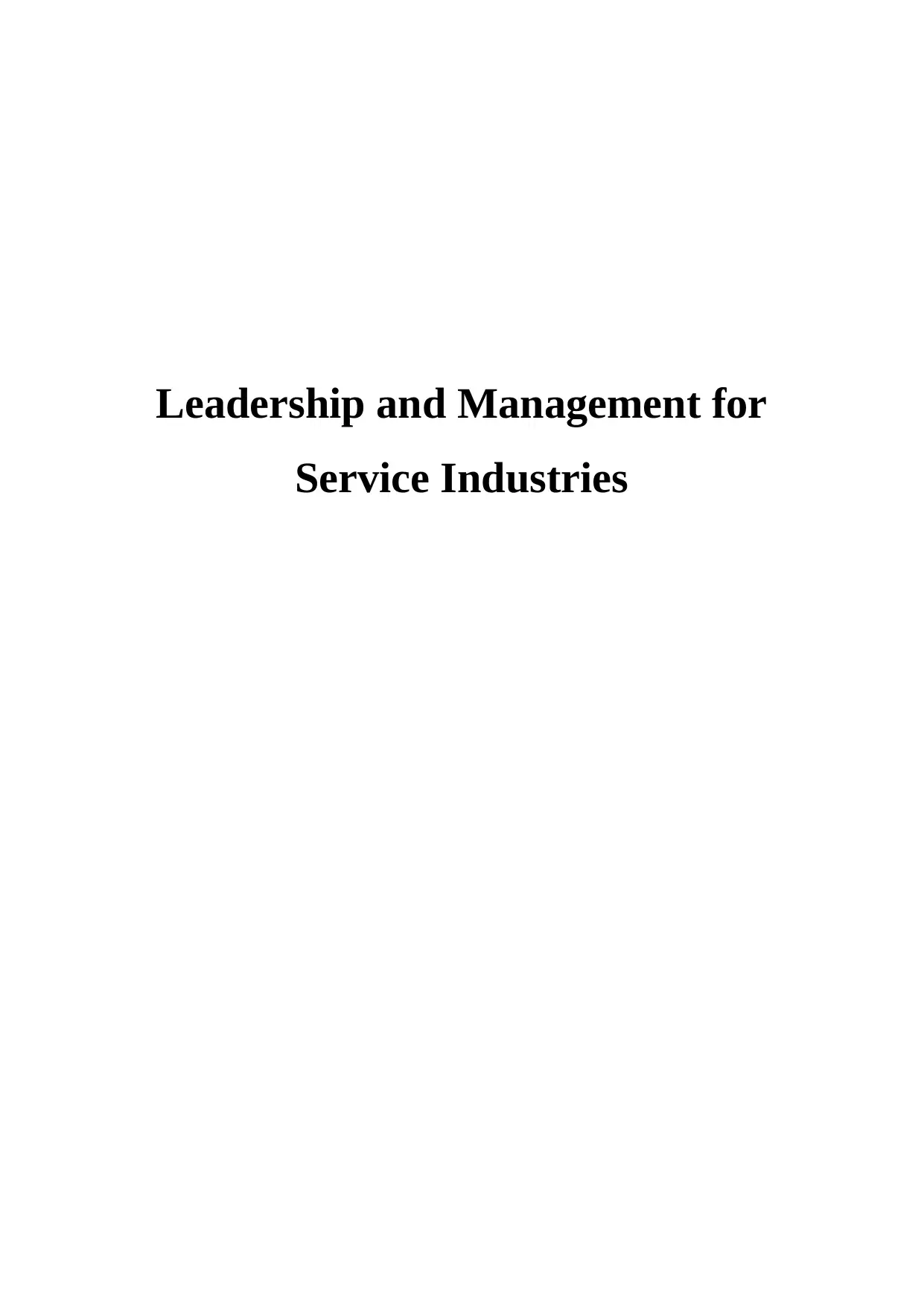
Leadership and Management for
Service Industries
Service Industries
Paraphrase This Document
Need a fresh take? Get an instant paraphrase of this document with our AI Paraphraser
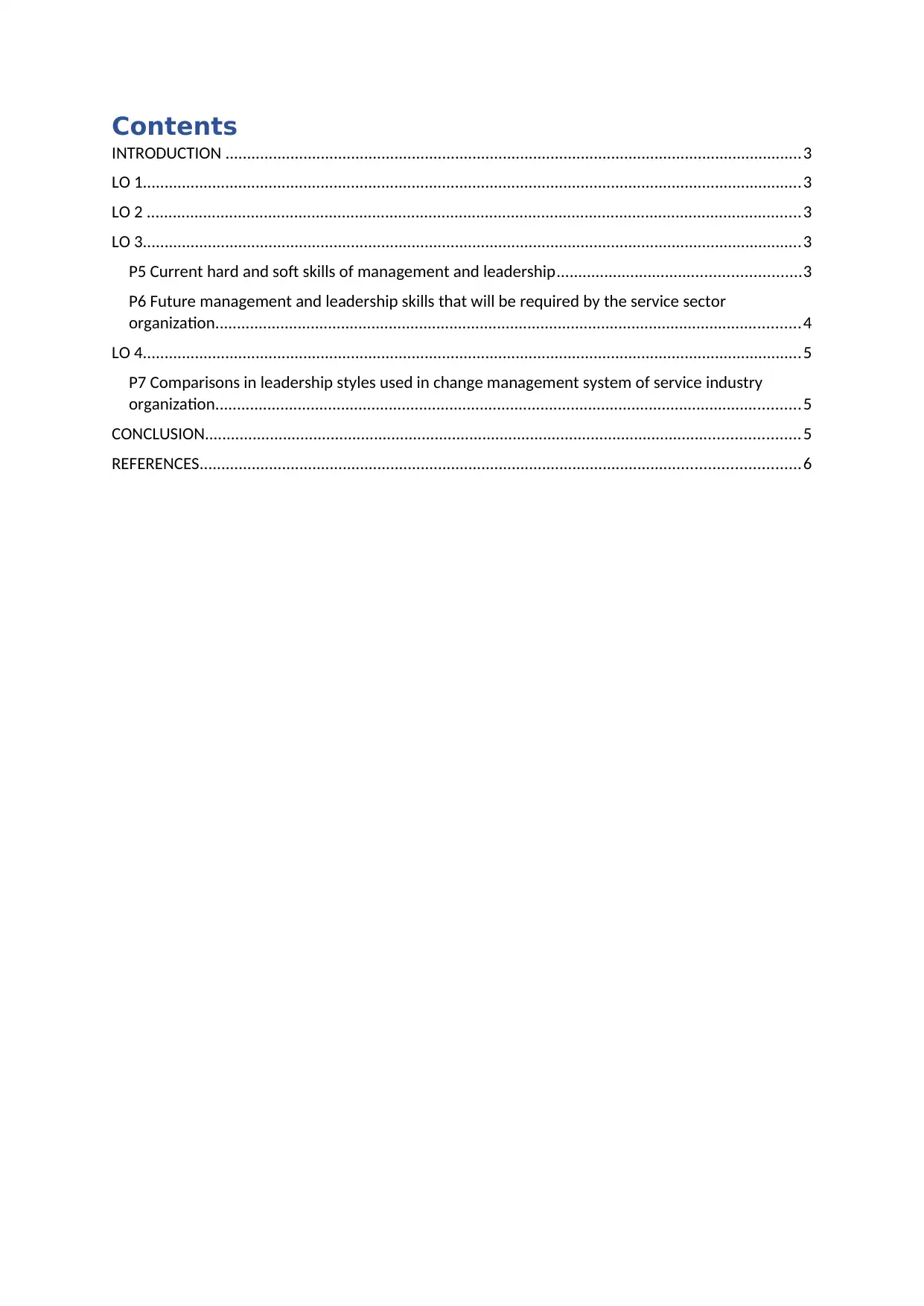
Contents
INTRODUCTION .....................................................................................................................................3
LO 1........................................................................................................................................................3
LO 2 .......................................................................................................................................................3
LO 3........................................................................................................................................................3
P5 Current hard and soft skills of management and leadership........................................................3
P6 Future management and leadership skills that will be required by the service sector
organization.......................................................................................................................................4
LO 4........................................................................................................................................................5
P7 Comparisons in leadership styles used in change management system of service industry
organization.......................................................................................................................................5
CONCLUSION.........................................................................................................................................5
REFERENCES..........................................................................................................................................6
INTRODUCTION .....................................................................................................................................3
LO 1........................................................................................................................................................3
LO 2 .......................................................................................................................................................3
LO 3........................................................................................................................................................3
P5 Current hard and soft skills of management and leadership........................................................3
P6 Future management and leadership skills that will be required by the service sector
organization.......................................................................................................................................4
LO 4........................................................................................................................................................5
P7 Comparisons in leadership styles used in change management system of service industry
organization.......................................................................................................................................5
CONCLUSION.........................................................................................................................................5
REFERENCES..........................................................................................................................................6
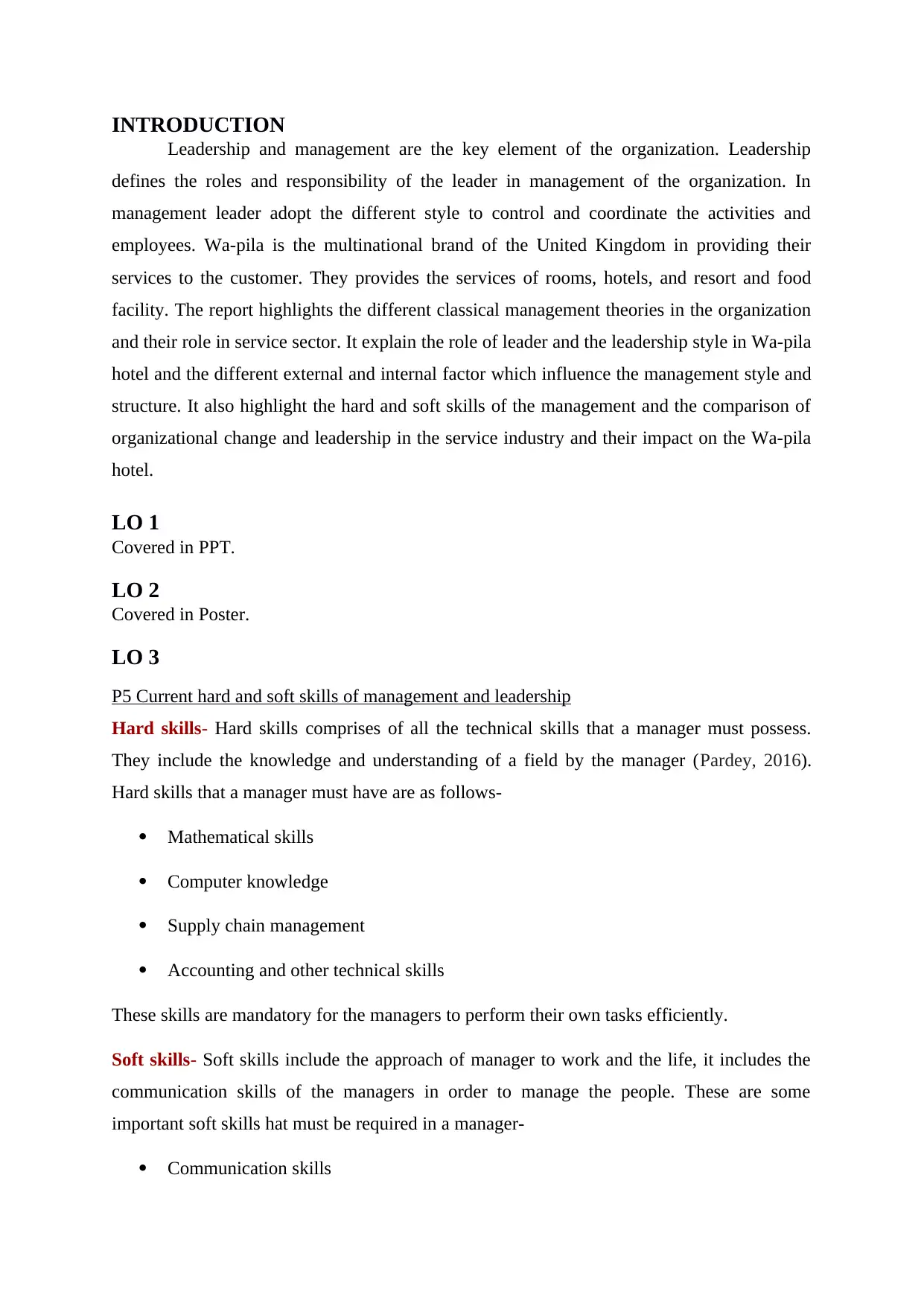
INTRODUCTION
Leadership and management are the key element of the organization. Leadership
defines the roles and responsibility of the leader in management of the organization. In
management leader adopt the different style to control and coordinate the activities and
employees. Wa-pila is the multinational brand of the United Kingdom in providing their
services to the customer. They provides the services of rooms, hotels, and resort and food
facility. The report highlights the different classical management theories in the organization
and their role in service sector. It explain the role of leader and the leadership style in Wa-pila
hotel and the different external and internal factor which influence the management style and
structure. It also highlight the hard and soft skills of the management and the comparison of
organizational change and leadership in the service industry and their impact on the Wa-pila
hotel.
LO 1
Covered in PPT.
LO 2
Covered in Poster.
LO 3
P5 Current hard and soft skills of management and leadership
Hard skills- Hard skills comprises of all the technical skills that a manager must possess.
They include the knowledge and understanding of a field by the manager (Pardey, 2016).
Hard skills that a manager must have are as follows-
Mathematical skills
Computer knowledge
Supply chain management
Accounting and other technical skills
These skills are mandatory for the managers to perform their own tasks efficiently.
Soft skills- Soft skills include the approach of manager to work and the life, it includes the
communication skills of the managers in order to manage the people. These are some
important soft skills hat must be required in a manager-
Communication skills
Leadership and management are the key element of the organization. Leadership
defines the roles and responsibility of the leader in management of the organization. In
management leader adopt the different style to control and coordinate the activities and
employees. Wa-pila is the multinational brand of the United Kingdom in providing their
services to the customer. They provides the services of rooms, hotels, and resort and food
facility. The report highlights the different classical management theories in the organization
and their role in service sector. It explain the role of leader and the leadership style in Wa-pila
hotel and the different external and internal factor which influence the management style and
structure. It also highlight the hard and soft skills of the management and the comparison of
organizational change and leadership in the service industry and their impact on the Wa-pila
hotel.
LO 1
Covered in PPT.
LO 2
Covered in Poster.
LO 3
P5 Current hard and soft skills of management and leadership
Hard skills- Hard skills comprises of all the technical skills that a manager must possess.
They include the knowledge and understanding of a field by the manager (Pardey, 2016).
Hard skills that a manager must have are as follows-
Mathematical skills
Computer knowledge
Supply chain management
Accounting and other technical skills
These skills are mandatory for the managers to perform their own tasks efficiently.
Soft skills- Soft skills include the approach of manager to work and the life, it includes the
communication skills of the managers in order to manage the people. These are some
important soft skills hat must be required in a manager-
Communication skills
⊘ This is a preview!⊘
Do you want full access?
Subscribe today to unlock all pages.

Trusted by 1+ million students worldwide
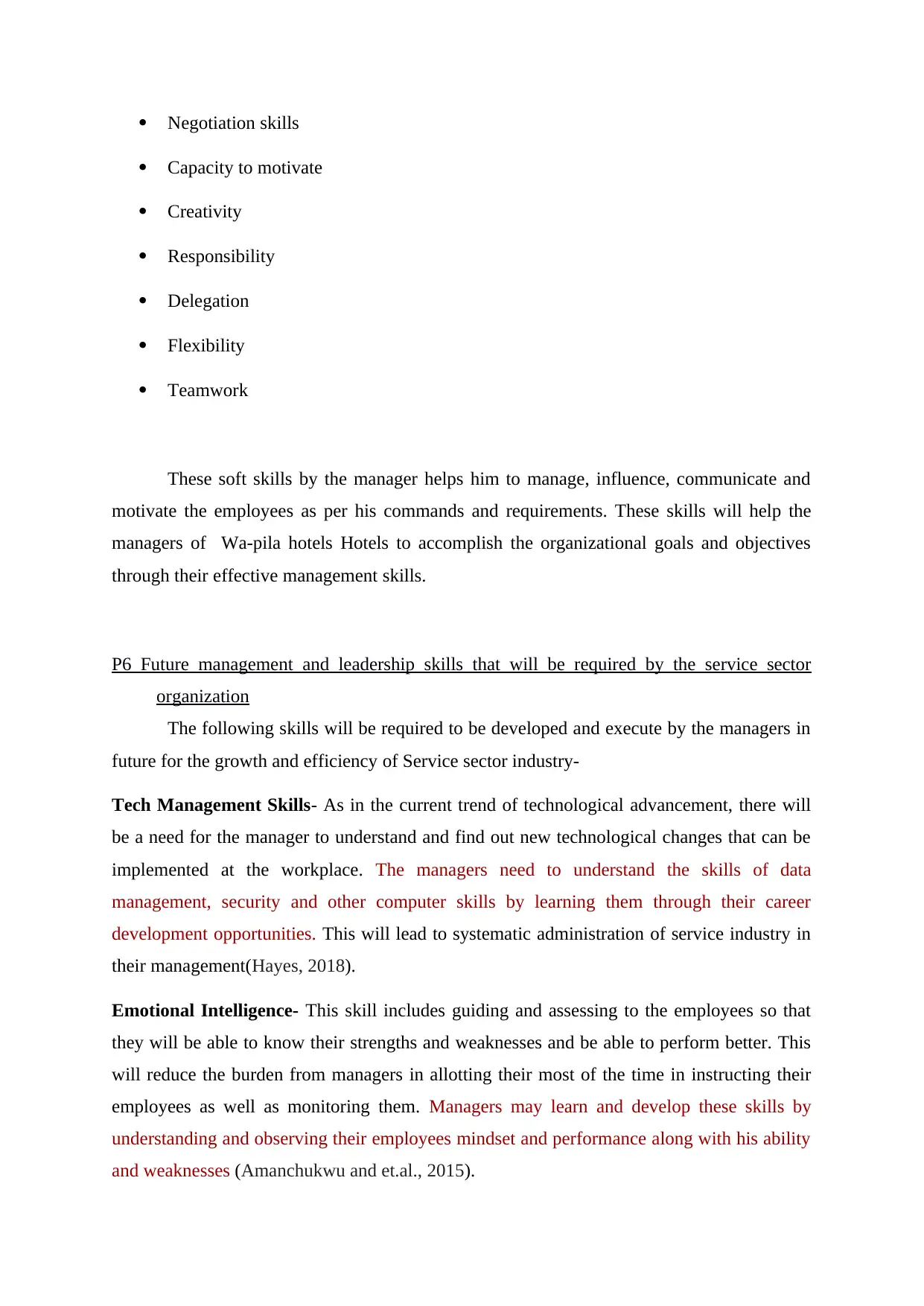
Negotiation skills
Capacity to motivate
Creativity
Responsibility
Delegation
Flexibility
Teamwork
These soft skills by the manager helps him to manage, influence, communicate and
motivate the employees as per his commands and requirements. These skills will help the
managers of Wa-pila hotels Hotels to accomplish the organizational goals and objectives
through their effective management skills.
P6 Future management and leadership skills that will be required by the service sector
organization
The following skills will be required to be developed and execute by the managers in
future for the growth and efficiency of Service sector industry-
Tech Management Skills- As in the current trend of technological advancement, there will
be a need for the manager to understand and find out new technological changes that can be
implemented at the workplace. The managers need to understand the skills of data
management, security and other computer skills by learning them through their career
development opportunities. This will lead to systematic administration of service industry in
their management(Hayes, 2018).
Emotional Intelligence- This skill includes guiding and assessing to the employees so that
they will be able to know their strengths and weaknesses and be able to perform better. This
will reduce the burden from managers in allotting their most of the time in instructing their
employees as well as monitoring them. Managers may learn and develop these skills by
understanding and observing their employees mindset and performance along with his ability
and weaknesses (Amanchukwu and et.al., 2015).
Capacity to motivate
Creativity
Responsibility
Delegation
Flexibility
Teamwork
These soft skills by the manager helps him to manage, influence, communicate and
motivate the employees as per his commands and requirements. These skills will help the
managers of Wa-pila hotels Hotels to accomplish the organizational goals and objectives
through their effective management skills.
P6 Future management and leadership skills that will be required by the service sector
organization
The following skills will be required to be developed and execute by the managers in
future for the growth and efficiency of Service sector industry-
Tech Management Skills- As in the current trend of technological advancement, there will
be a need for the manager to understand and find out new technological changes that can be
implemented at the workplace. The managers need to understand the skills of data
management, security and other computer skills by learning them through their career
development opportunities. This will lead to systematic administration of service industry in
their management(Hayes, 2018).
Emotional Intelligence- This skill includes guiding and assessing to the employees so that
they will be able to know their strengths and weaknesses and be able to perform better. This
will reduce the burden from managers in allotting their most of the time in instructing their
employees as well as monitoring them. Managers may learn and develop these skills by
understanding and observing their employees mindset and performance along with his ability
and weaknesses (Amanchukwu and et.al., 2015).
Paraphrase This Document
Need a fresh take? Get an instant paraphrase of this document with our AI Paraphraser
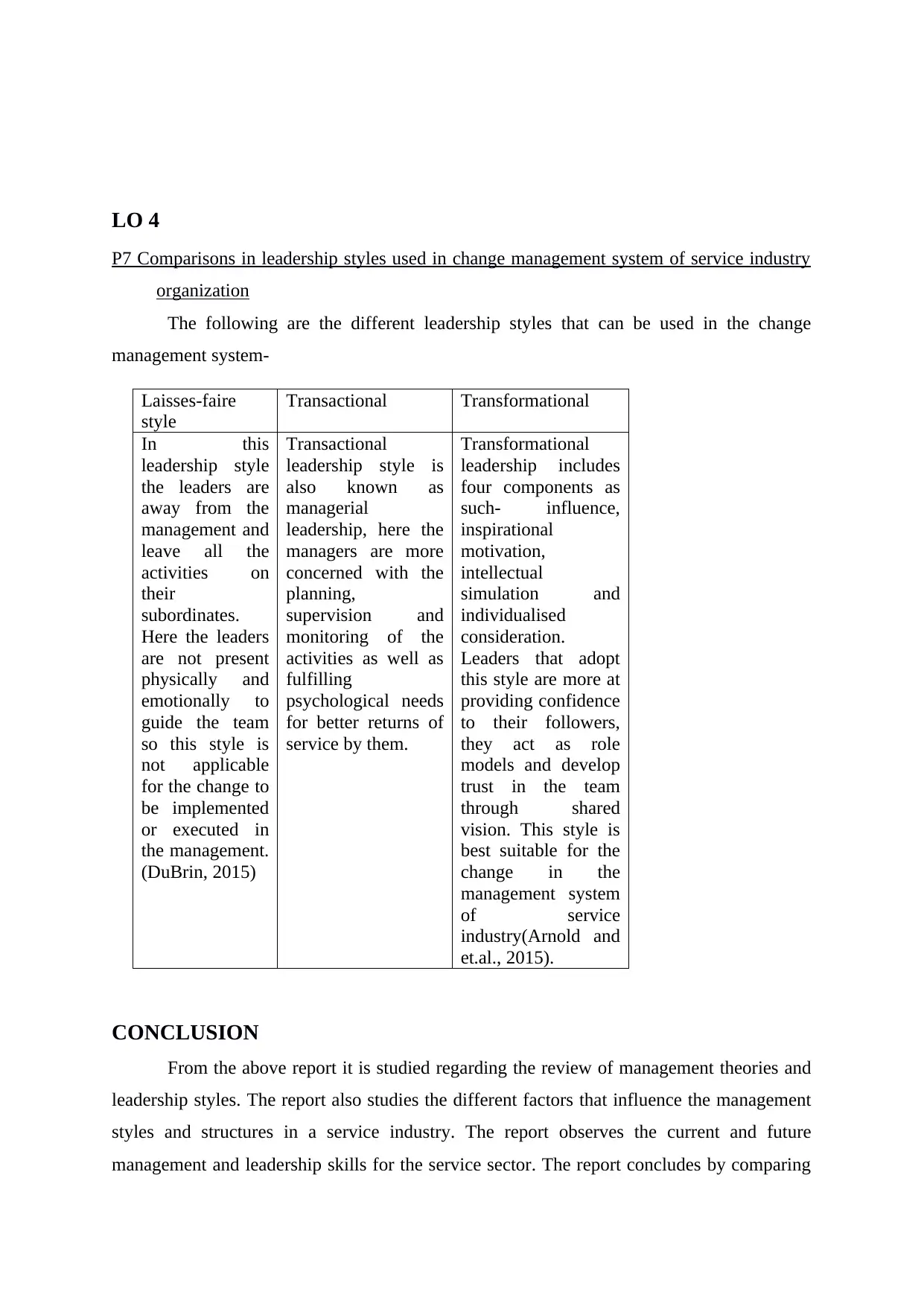
LO 4
P7 Comparisons in leadership styles used in change management system of service industry
organization
The following are the different leadership styles that can be used in the change
management system-
Laisses-faire
style
Transactional Transformational
In this
leadership style
the leaders are
away from the
management and
leave all the
activities on
their
subordinates.
Here the leaders
are not present
physically and
emotionally to
guide the team
so this style is
not applicable
for the change to
be implemented
or executed in
the management.
(DuBrin, 2015)
Transactional
leadership style is
also known as
managerial
leadership, here the
managers are more
concerned with the
planning,
supervision and
monitoring of the
activities as well as
fulfilling
psychological needs
for better returns of
service by them.
Transformational
leadership includes
four components as
such- influence,
inspirational
motivation,
intellectual
simulation and
individualised
consideration.
Leaders that adopt
this style are more at
providing confidence
to their followers,
they act as role
models and develop
trust in the team
through shared
vision. This style is
best suitable for the
change in the
management system
of service
industry(Arnold and
et.al., 2015).
CONCLUSION
From the above report it is studied regarding the review of management theories and
leadership styles. The report also studies the different factors that influence the management
styles and structures in a service industry. The report observes the current and future
management and leadership skills for the service sector. The report concludes by comparing
P7 Comparisons in leadership styles used in change management system of service industry
organization
The following are the different leadership styles that can be used in the change
management system-
Laisses-faire
style
Transactional Transformational
In this
leadership style
the leaders are
away from the
management and
leave all the
activities on
their
subordinates.
Here the leaders
are not present
physically and
emotionally to
guide the team
so this style is
not applicable
for the change to
be implemented
or executed in
the management.
(DuBrin, 2015)
Transactional
leadership style is
also known as
managerial
leadership, here the
managers are more
concerned with the
planning,
supervision and
monitoring of the
activities as well as
fulfilling
psychological needs
for better returns of
service by them.
Transformational
leadership includes
four components as
such- influence,
inspirational
motivation,
intellectual
simulation and
individualised
consideration.
Leaders that adopt
this style are more at
providing confidence
to their followers,
they act as role
models and develop
trust in the team
through shared
vision. This style is
best suitable for the
change in the
management system
of service
industry(Arnold and
et.al., 2015).
CONCLUSION
From the above report it is studied regarding the review of management theories and
leadership styles. The report also studies the different factors that influence the management
styles and structures in a service industry. The report observes the current and future
management and leadership skills for the service sector. The report concludes by comparing

the different leadership styles that can be used in change management system of service
sector industry.
sector industry.
⊘ This is a preview!⊘
Do you want full access?
Subscribe today to unlock all pages.

Trusted by 1+ million students worldwide
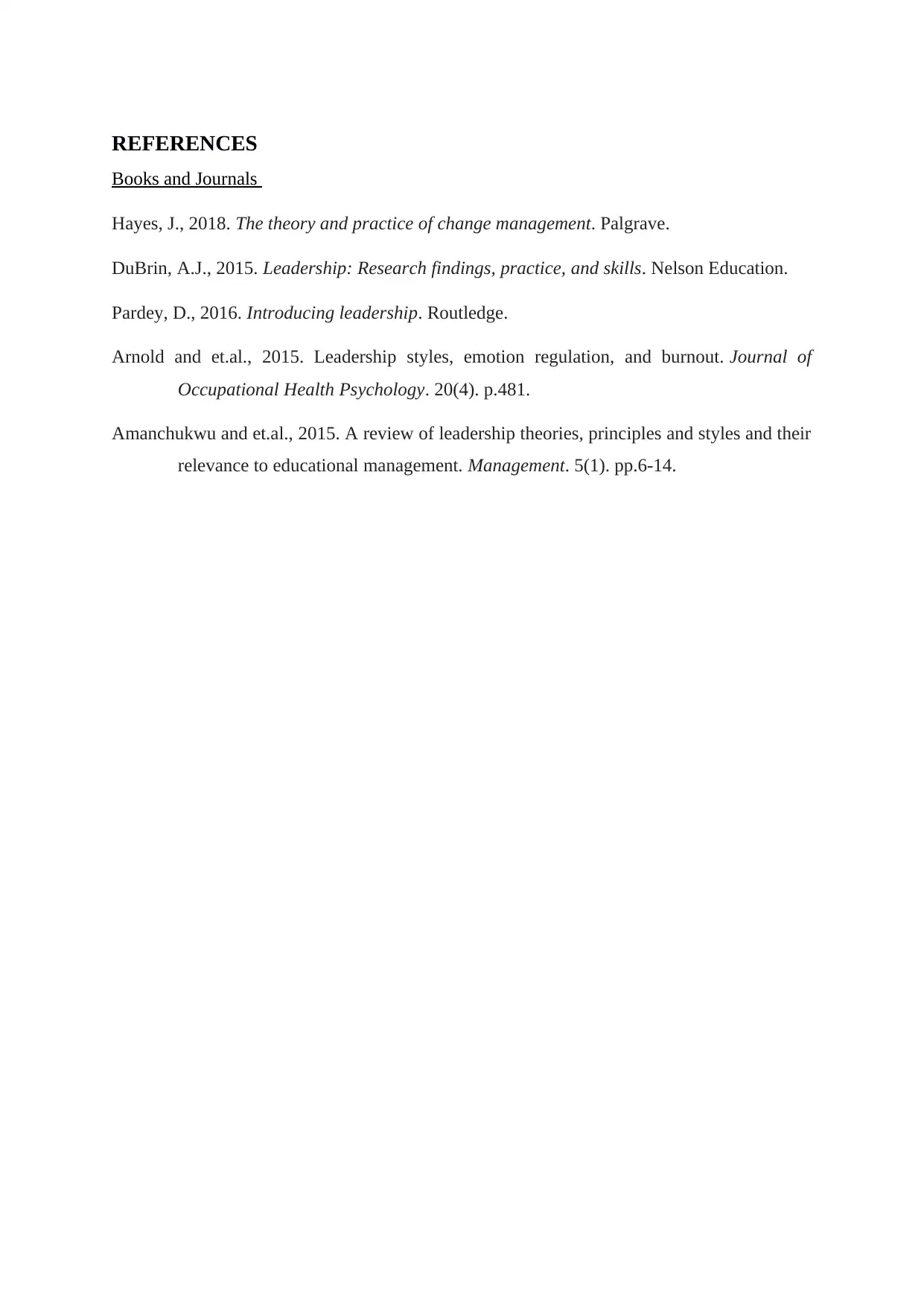
REFERENCES
Books and Journals
Hayes, J., 2018. The theory and practice of change management. Palgrave.
DuBrin, A.J., 2015. Leadership: Research findings, practice, and skills. Nelson Education.
Pardey, D., 2016. Introducing leadership. Routledge.
Arnold and et.al., 2015. Leadership styles, emotion regulation, and burnout. Journal of
Occupational Health Psychology. 20(4). p.481.
Amanchukwu and et.al., 2015. A review of leadership theories, principles and styles and their
relevance to educational management. Management. 5(1). pp.6-14.
Books and Journals
Hayes, J., 2018. The theory and practice of change management. Palgrave.
DuBrin, A.J., 2015. Leadership: Research findings, practice, and skills. Nelson Education.
Pardey, D., 2016. Introducing leadership. Routledge.
Arnold and et.al., 2015. Leadership styles, emotion regulation, and burnout. Journal of
Occupational Health Psychology. 20(4). p.481.
Amanchukwu and et.al., 2015. A review of leadership theories, principles and styles and their
relevance to educational management. Management. 5(1). pp.6-14.
1 out of 7
Related Documents
Your All-in-One AI-Powered Toolkit for Academic Success.
+13062052269
info@desklib.com
Available 24*7 on WhatsApp / Email
![[object Object]](/_next/static/media/star-bottom.7253800d.svg)
Unlock your academic potential
Copyright © 2020–2026 A2Z Services. All Rights Reserved. Developed and managed by ZUCOL.




